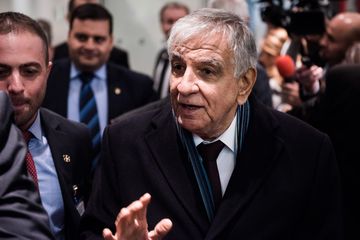Download PDF :


Gulf News, 22 Dec 2016
Iraq said most international oil companies working in the country, along with the semi-autonomous region of Kurdistan, have agreed to cut crude output to fulfil an Opec accord.
Iraq is fully committed to delivering on Opec’s November 30 agreement to reduce supplies, Oil Minister Jabbar Al Luaibi said on Thursday in Cairo at a meeting of the Organisation of Arab Petroleum Exporting Countries, known as OAPEC.
“Kurdistan is within Iraq and we are in agreement,” said Al Luaibi.
The Kurdistan Regional Government, which accounts for about 12 per cent of the nation’s output, said on December 5 it didn’t expect to make significant output cutbacks to fulfil the Opec accord. The KRG didn’t immediately respond when asked for comment. Genel Energy Plc and Gulf Keystone Petroleum Ltd., which operate in the region, declined to comment, while DNO ASA, which also produces there, didn’t immediately respond.
The Organisation of Petroleum Exporting Countries resolved on November 30 to reduce production by 1.2 million barrels a day in an effort to end a three-year supply glut and buoy prices. The plan was widened on December 10 when 11 non-members including Russia and Kazakhstan promised to join in the cuts.
Iraq, Opec’s second-biggest producer after Saudi Arabia, pledged to trim output by 210,000 barrels a day, or 4.5 per cent of its total production. The country initially resisted the plan to reduce supply, saying it deserved to be exempt while battling Daesh militants and reviving its oil industry after years of conflict and sanctions.
Iraq is in talks to supply crude to Egypt, Al Luaibi said. Saudi Arabian Oil Co., known as Saudi Aramco, has halted shipments of oil products to Egypt since October, forcing the Arab world’s most populous nation to buy fuels on global markets at a higher cost.
Separately, Iraq’s oil-rich Kirkuk province, under the protection of the Kurds since 2014, said it’s willing to reduce crude production if required.
The northern province is prepared to reduce output if the decrease is “proportional” with the country’s other regions, Ahmad Al Askari, head of Kirkuk province’s oil, energy and industry committee, said by phone. It hasn’t yet received an official request to cut production. The state-run North Oil Co. pumps about 160,000 to 170,000 barrels a day from the region, home to Iraq’s oldest producing wells.
EGYPT SEEKS TO IMPORT CRUDE DIRECTLY FROM IRAQ
Reuters, 22 Dec 2016
Egypt's Petroleum Minister Tarek El Molla said on Thursday his country was seeking to reach an agreement with Iraq over importing crude oil directly and that he hoped to finalise the deal by the first quarter of 2017.
El Molla told reporters on the sidelines of a meeting of the Organization of Arab Petroleum Exporting Countries (OAPEC) that Egypt aims to import between 1 million and 2 million barrels per month from Iraq.
The move follows Saudi Arabia informing Egypt in last month that shipments of oil products expected under a $23 billion aid deal had been halted indefinitely.
"We are seeking to directly import crude oil from Iraq. We already use Iraqi oil but we get it from international markets but we hope to have a direct government to government agreement," El Molla said.
Egypt has gone from exporting energy to being a net energy importer as domestic output has failed to keep pace with rising demand. The government is seeking alternative solutions to help the country cope.
Gulf Arab countries, led by Saudi Arabia, have pumped billions of dollars into Egypt's flagging economy since general-turned-president Abdel Fattah al-Sisi took over after a year of divisive rule by the Muslim Brotherhood.
But Riyadh has become frustrated with his lack of economic reforms and reluctance to be drawn into the conflict in Yemen, leaving Egypt to search for alternative sources of energy.





























